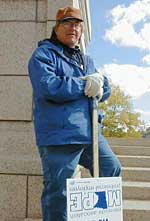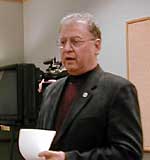Ventura says he'll meet with union members - as long as media isn't there
By Laura McCallum
Minnesota Public Radio
October 5, 2001 At the end of the first week of Minnesota's largest state employee strike, no new talks are scheduled and neither side shows any sign of movement. State officials say state government is weathering the loss of about 23,000 workers, and Gov. Ventura says the striking workers should accept the state's offer and come back to work. Members of MAPE and AFSCME Council 6 walked off the job on Monday over wages and health insurance.
| |
|
|
|
||
Ventura says he's willing to meet with striking workers any time, as long as the media isn't around. He says he talked to picketers at the governor's mansion one night this week because no reporters were there. He says the media is only interested in confrontation. While Ventura was doing his radio show from his office, outside the Capitol, hundreds of striking workers gathered on the front steps, some yelling at the governor to come out and talk to them.
| |
|
|
|
||
There appears to be no middle ground right now. State mediator Lance Teachworth says he's been in daily contact with both sides, but sees no reason to call them back to the bargaining table. He says he'll re-evaluate the situation next week.
State officials say while the first week of the strike has been challenging, state government is still functioning. They say about 4,000 workers have been crossing the picket line each day out of the 28,000 eligible to strike.
Employee Relations Commissioner Julien Carter says his office has received about 100 complaints from employees who've returned to work and feel they've been harassed. "Most of the threats... would be in the range of name-calling," according to Carter. "As you can imagine, if you were to get those kind of calls, it would be kind of chilling."
State officials say because of the threat of harassment for employees crossing the picket line, they won't report the number of returning workers for any single agency.
| |
|
|
|
||
Weiszhaar says the state has 862 snowplows, but only 161 employees qualified to drive them who are still on the job. He says MnDOT is hiring temporary employees, and will plow priority roads first, starting with the interstates. With some parts of northern Minnesota expected to get snowfall this weekend, those plans could soon be put to the test.



